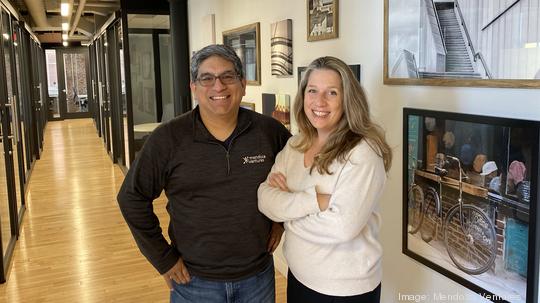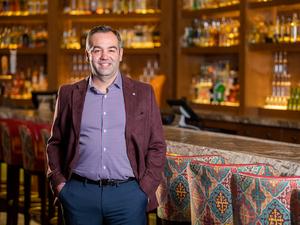
Fears of an economic recession are spreading, and venture capitalists and startup founders in Greater Boston are already waving good-bye to times of wildly high valuations and relatively easy access to capital. The downturn follows two years of startups earning record-breaking amounts of venture capital.
To help make sense of this volatile environment, BostInno spoke with three Boston venture capitalists who invest in early-stage companies. The venture capitalists shared the advice they are providing to portfolio companies about how to handle fundraising, layoffs and leadership in the months ahead.
Sign up for The Beat, BostInno’s free daily innovation newsletter from BostInno reporter Hannah Green. See past examples here.
Funding deals may take longer and have less favorable terms, but venture capital is still out there.
Even just a few months ago, the market was very active. Sooah Cho, a principal at Underscore VC, said her team used to prepare founders to make their rounds last 12-18 months. Now, Cho said the recommendation is a minimum of 24 months.
“A lot of folks are taking time to take stock of resources. What is the best case scenario and the worst case scenario for our business? What kind of resources are we going to need to put in place to make sure that we hit the growth milestones that we have?” Cho said.
Sarah Hodges, a partner at Pillar VC, said she’s still seeing activity at the seed stage right now, but “late-stage rounds have slowed dramatically and valuations have fallen off a cliff.” She said the economy is just entering the first stage of this cycle, but the bar to access funding is already higher.
“Founders should consider how to extend their runway to ensure that they have plenty of room to hit compelling milestones. It's likely going to take longer and be much more difficult to raise for the next 12-24 months, particularly at later stages,” Hodges said in an email.
She recommended that startups consider reopening their last round at a flat valuation. Hodges said this is a good time to reach back out to investors who were not included in the first raise, but remain interested.
“It's also a good time to look at expenses and pair back to the essentials needed to drive growth, or in some cases, simply to keep the lights on,” she said.
Cho said that going back to past investors or prospective investors could prove successful in raising additional funds. She added that some companies are looking into lines of credit to establish an “extra safety net.”
Concerns about a risky market may disproportionately affect founders from underrepresented backgrounds.
Adrian and Senofer Mendoza, co-founders of the fintech AI and cybersecurity venture fund Mendoza Ventures, invest heavily in startups led by immigrants, people of color and women. The firm is considered the first Latinx-owned venture fund on the East Coast.
Adrian said he is concerned that as venture capitalists and angel investors get scared by the worsening market, they will invest less in diverse founders.
“When you look at founders of color and female founders, they’re going to be perceived as risk because they’re not the white guy from Stanford,” Mendoza said.
Mendoza said a worsening economic state could also prevent more founders of color or female founders from leaving their day job to join or start a startup, or to enter into the field of venture capital.
“Being Latino, it’s culturally risky to go out on your own,” Mendoza said. “I think as this goes on, the nontraditional communities, the underrepresented communities are going to get hit by most of this.”
Mergers and acquisitions will become the dominant exit strategy. The IPO window is closing.
Mendoza Ventures has long operated on a model that pursues mergers and acquisitions for its portfolio companies rather than IPOs. Adrian Mendoza said he sees the larger market falling into line with this approach in the coming months.
“I’ve also heard from other analysts, and we have validated this, that we’re going to see a massive and growing M&A from corporates and strategics in the next three to five years,” he said.
Mendoza Ventures is warning its portfolio companies that there might not be Series C or D capital available to sustain them. He said the firm is encouraging companies to build a self-sustaining business model and keep an open mind to nontraditional exits and opportunities like private equity or roll-up strategies.
The layoffs and hiring freezes will mean more access to talent for companies that are hiring.
Nationally, layoffs at Netflix and Coinbase, as well as hiring freezes at companies like Tesla and Wayfair, have made headlines. The uncertain market is also having an impact on jobs in Boston. Earlier this month, the Boston Business Journal reported that hundreds of people working at companies based in the Boston area have lost their positions this year.
Those laid-off employees will join other job seekers in a tightening employment market. But Hodges said the news isn’t all bad, especially if you’re a founder looking to make hires in the months ahead.
“The market is already being flooded with talent as companies embark on layoffs and team members start to consider their job security and begin to pursue new more secure or more fulfilling options. This volume will only increase in the next few months,” she said.
If your company needs to make layoffs, make sure it is not ‘death by a thousand cuts.’
Cho said the best advice she has to approaching layoffs is to “do it quickly and do it deeply.” Multiple rounds of layoffs will cause paranoia and fear among employees and lose their trust.
“It can be one layoff and you can clearly, with a straight face, tell your employees that this is basically the step we had to take and we’re not going to be making any other layoffs so that you can give a sense of security,” Cho said.
She added that it’s easier to hire folks back than to rebuild a team culture after a series of unpredictable staff cuts.
Final advice for company leaders.
Whether it’s about layoffs or the company’s future, Adrian Mendoza said it’s critical for leaders to be transparent with their teams. Mendoza said this is a moment for company leaders to step up and be the visionary to their teams and be open about the risks and rewards ahead.
“As founders, they have to be eyes wide open about cash flow, about profitability, about a potential M&A,” Mendoza said. “They have to be driving the car and bring everyone behind them.”








